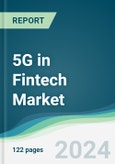5G, or the fifth-generation technology for cellular networks, is the latest development in the cellular network industry. It offers a higher internet speed, with greater uploading and downloading speeds than previous generations. The 5G technology also offers improved network capacity and consistent network connections. It offers multiple benefits, like reduced latency in network connection and a uniform user experience. In the fintech sector, 5G can offer many critical applications.
Data plays a critical role in fintech, or the financial technology industry, generating huge amounts of data every passing movement. The reliable connectivity and higher connectivity speed of the 5G technology enable the fintech industry in real-time data collection, analysis, and transfer. The application of 5G in fintech also enables multiple companies and organizations to implement various new technologies, like artificial intelligence (AI) and data analytics, for efficient and faster data collection and analysis. Using 5G in the fintech sector also helps in improving and optimizing user experience, as it reduces waiting time and enhances faster services for users.
The increasing global risk of cybersecurity and data breaches is forecasted to be a major restraint to the global 5G in the fintech market. The world has witnessed an increasing number of breaches and cyberattacks, forcing data-driven industries, like the fintech sector, to invest large amounts in securing their data.
5G In Fintech Market Drivers:
- Bolstering growth in digital banking and fintech investments is stimulating market expansion.
The rapid evolution of the fintech sector globally will bolster contactless transactions, account opening, and mortgages, driving the demand for high-speed network connectivity. This can provide a real-time user experience, making 5G technology an ideal option for the industry. Similarly, rapid urbanization has also fastened the transition towards a modern and digital banking approach, enhancing the scale of online and mobile banking transitions globally. For instance, according to GSM’s “The State of the Industry Report on Mobile Economy 2024”, the registered mobile active account in 2023 reached up to 1.73 billion, signifying a 12% YoY growth. In the same year, the strength of active mobile money accounts stood at 435 million, which represented a 9% growth.
5G in Fintech Market Geographical Outlook
- Asia Pacific is forecasted to hold a major share of the 5G In Fintech Market.
Reasons for buying this report::
- Insightful Analysis: Gain detailed market insights covering major as well as emerging geographical regions, focusing on customer segments, government policies and socio-economic factors, consumer preferences, industry verticals, other sub- segments.
- Competitive Landscape: Understand the strategic maneuvers employed by key players globally to understand possible market penetration with the correct strategy.
- Market Drivers & Future Trends: Explore the dynamic factors and pivotal market trends and how they will shape up future market developments.
- Actionable Recommendations: Utilize the insights to exercise strategic decision to uncover new business streams and revenues in a dynamic environment.
- Caters to a Wide Audience: Beneficial and cost-effective for startups, research institutions, consultants, SMEs, and large enterprises.
What do businesses use our reports for?
Industry and Market Insights, Opportunity Assessment, Product Demand Forecasting, Market Entry Strategy, Geographical Expansion, Capital Investment Decisions, Regulatory Framework & Implications, New Product Development, Competitive IntelligenceReport Coverage:
- Historical data & forecasts from 2022 to 2029
- Growth Opportunities, Challenges, Supply Chain Outlook, Regulatory Framework, Customer Behaviour, and Trend Analysis
- Competitive Positioning, Strategies, and Market Share Analysis
- Revenue Growth and Forecast Assessment of segments and regions including countries
- Company Profiling (Strategies, Products, Financial Information, and Key Developments among others)
The 5G In Fintech Market is segmented and analyzed as follows:
- By Application
- Branch
- Banker-Facing
- Customer-Facing
- ATM
- Others
- Branch
- By Component
- Hardware
- Software
- Services
- By Geography
- Americas
- United States
- Others
- Europe, Middle East, and Africa
- Germany
- UK
- Others
- Asia Pacific
- China
- Japan
- South Korea
- Others
- Americas
Table of Contents
Companies Mentioned
Some of the key companies profiled in this 5G in Fintech Market report include:- Mitsubishi Electric Corporation
- Keysight Technologies
- National Instruments
- Ericsson AB
- Huawei Technologies Co. Ltd
- Qualcomm Technologies Co. Ltd
- ZTE Corporation
- Nokia
- NEC Corporation
- Broadcom
- Athonet
Table Information
| Report Attribute | Details |
|---|---|
| No. of Pages | 122 |
| Published | September 2024 |
| Forecast Period | 2024 - 2029 |
| Estimated Market Value ( USD | $ 19.42 billion |
| Forecasted Market Value ( USD | $ 122.47 billion |
| Compound Annual Growth Rate | 44.5% |
| Regions Covered | Global |
| No. of Companies Mentioned | 12 |









